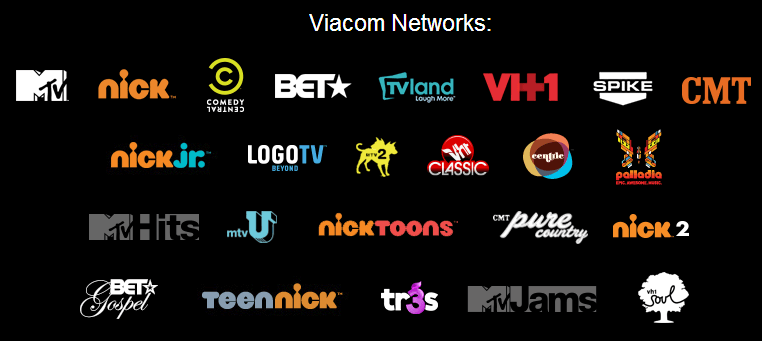 Small cable systems across the country and on overseas military bases are being granted hourly reprieves that are keeping up to 24 Viacom-owned cable channels on the air after negotiations to extend an agreement with their program buyer stalled.
Small cable systems across the country and on overseas military bases are being granted hourly reprieves that are keeping up to 24 Viacom-owned cable channels on the air after negotiations to extend an agreement with their program buyer stalled.
Cable operators belonging to the National Cable TV Cooperative, which represents independent cable systems on cable programming matters, report Viacom is demanding an unprecedented 100 percent rate increase for its networks and a guaranteed rate hike of 10% annually on each of its channels.
Viacom’s demands would cost each subscriber at least $4 a month, noted Jack Capparell, general manager of Service Electric’s cable system in the Lehigh Valley of Pennsylvania. Service Electric is a private, family owned cable business with 250,000 subscribers in central and northeastern Pennsylvania and northwestern New Jersey.
The impasse also affects cable systems serving American military bases. Americable has notified subscribers in Yokosuka, Atsugi, Iwakuni, and Sasebo, Japan Viacom was likely to cut off 10 of its cable channels to military families sometime today. Allied Telesis, which offers service to Air Force bases in Japan is also expected to lose programming.
 NCTC members complain Viacom requires cable systems to carry nearly all of its lineup, including lesser-known channels few customers have even heard of, much less want. Even if a cable system chooses not to air a Viacom channel, Viacom’s contracts require cable providers to pay for them if they want to carry Viacom’s most popular networks.
NCTC members complain Viacom requires cable systems to carry nearly all of its lineup, including lesser-known channels few customers have even heard of, much less want. Even if a cable system chooses not to air a Viacom channel, Viacom’s contracts require cable providers to pay for them if they want to carry Viacom’s most popular networks.
Some cable systems are breaking away from NCTC’s negotiations and opening one on one talks with Viacom. Metrocast secured an agreement for its customers earlier today by negotiating directly with Viacom.
 For most affected cable operators, there is a ‘wait and see what happens’ approach. Others, including Cable ONE, have already moved to replace the Viacom networks with other channels.
For most affected cable operators, there is a ‘wait and see what happens’ approach. Others, including Cable ONE, have already moved to replace the Viacom networks with other channels.
“Viacom asked for a rate increase greater than 100%, despite the fact that viewing is down on 12 of their 15 networks – some by more than 30% since 2010,” said Cable ONE. “We asked Viacom to either reduce their rates or allow us to drop some of their less popular networks to reduce the total cost. They refused these reasonable requests.”
 Earlier today, Cable ONE didn’t wait for Viacom to pull the plug. They pulled it themselves.
Earlier today, Cable ONE didn’t wait for Viacom to pull the plug. They pulled it themselves.
“Cable ONE has let these networks go and expects to add many top-rated networks you’ve requested and expand several other highly requested networks to our most popular level of service. Some of the new networks include BBC America, Sprout, Investigation Discovery, the Blaze, Hallmark Channel, National Geographic, TV One, Sundance, and more,” said the company, which expects to publish a full list of the new networks on Wednesday.
Viacom responded with a news release tailored for each affected provider:
 We are offering Service Electric a double-digit discount off of our standard rate card. It is a better deal than HUNDREDS of other TV providers in the country have agreed to. We have been actively trying to get a deal done with Service Electric for months and they have refused to negotiate in any meaningful way. And now, on top of this, Service Electric is throwing out numbers which simply aren’t true. Our expiring deal with Service Electric is nearly five years old. In that time, we have been great partners and given Service Electric more channels, more on demand content and access to our content beyond the TV – at no additional cost. We don’t understand why Service Electric has chosen to negotiate in this manner. And now, as a result of their lack of interest in coming to a mutually beneficial agreement, you are at risk of losing 19 Viacom networks. We are serious about getting a deal done.
We are offering Service Electric a double-digit discount off of our standard rate card. It is a better deal than HUNDREDS of other TV providers in the country have agreed to. We have been actively trying to get a deal done with Service Electric for months and they have refused to negotiate in any meaningful way. And now, on top of this, Service Electric is throwing out numbers which simply aren’t true. Our expiring deal with Service Electric is nearly five years old. In that time, we have been great partners and given Service Electric more channels, more on demand content and access to our content beyond the TV – at no additional cost. We don’t understand why Service Electric has chosen to negotiate in this manner. And now, as a result of their lack of interest in coming to a mutually beneficial agreement, you are at risk of losing 19 Viacom networks. We are serious about getting a deal done.
Virtually the entire state of Alaska is also affected.
“We’ve unified to fight for Alaskans and to work toward a fair, long-term agreement that keeps prices stable for our customers,” said Paul Landes, GCI senior vice president. “Viacom wants a rate increase that is 40 times that of the rate of inflation. Alaska pay TV providers, along with 700 small to mid-sized operators nationally, are saying ‘no’ to Viacom’s take all 26 channels or nothing demands.”
GCI is joined by Alaskan providers MTA and KPU in the dispute.
[flv]http://www.phillipdampier.com/video/Cable ONE Viacom Channels Removed New Channels Added 4-1-14.mp4[/flv]
Cable ONE released this video earlier today informing customers they were dropping Viacom networks. (1:00)
 Montréal-based Cogeco Communications today announced its U.S. Atlantic Broadband subsidiary was growing larger with the acquisition of MetroCast’s cable systems in Maryland, Maine, New Hampshire, Pennsylvania, and Virginia in a deal worth $1.4 billion.
Montréal-based Cogeco Communications today announced its U.S. Atlantic Broadband subsidiary was growing larger with the acquisition of MetroCast’s cable systems in Maryland, Maine, New Hampshire, Pennsylvania, and Virginia in a deal worth $1.4 billion. 37,000 phone customers to Atlantic Broadband.
37,000 phone customers to Atlantic Broadband.

 Subscribe
Subscribe Atlantic Broadband will be the new name of MetroCast Communications of Connecticut, as Montréal-based Cogeco Cable, Inc., takes ownership of the small cable operator and its parent Harron Communications, L.P., in a $200 million deal.
Atlantic Broadband will be the new name of MetroCast Communications of Connecticut, as Montréal-based Cogeco Cable, Inc., takes ownership of the small cable operator and its parent Harron Communications, L.P., in a $200 million deal. Small cable systems across the country and on overseas military bases are being granted hourly reprieves that are keeping up to 24 Viacom-owned cable channels on the air after negotiations to extend an agreement with their program buyer stalled.
Small cable systems across the country and on overseas military bases are being granted hourly reprieves that are keeping up to 24 Viacom-owned cable channels on the air after negotiations to extend an agreement with their program buyer stalled. NCTC members complain Viacom requires cable systems to carry nearly all of its lineup, including lesser-known channels few customers have even heard of, much less want. Even if a cable system chooses not to air a Viacom channel, Viacom’s contracts require cable providers to pay for them if they want to carry Viacom’s most popular networks.
NCTC members complain Viacom requires cable systems to carry nearly all of its lineup, including lesser-known channels few customers have even heard of, much less want. Even if a cable system chooses not to air a Viacom channel, Viacom’s contracts require cable providers to pay for them if they want to carry Viacom’s most popular networks. For most affected cable operators, there is a ‘wait and see what happens’ approach. Others, including Cable ONE, have already moved to replace the Viacom networks with other channels.
For most affected cable operators, there is a ‘wait and see what happens’ approach. Others, including Cable ONE, have already moved to replace the Viacom networks with other channels. Earlier today, Cable ONE didn’t wait for Viacom to pull the plug. They pulled it themselves.
Earlier today, Cable ONE didn’t wait for Viacom to pull the plug. They pulled it themselves. We are offering Service Electric a double-digit discount off of our standard rate card. It is a better deal than HUNDREDS of other TV providers in the country have agreed to. We have been actively trying to get a deal done with Service Electric for months and they have refused to negotiate in any meaningful way. And now, on top of this, Service Electric is throwing out numbers which simply aren’t true. Our expiring deal with Service Electric is nearly five years old. In that time, we have been great partners and given Service Electric more channels, more on demand content and access to our content beyond the TV – at no additional cost. We don’t understand why Service Electric has chosen to negotiate in this manner. And now, as a result of their lack of interest in coming to a mutually beneficial agreement, you are at risk of losing 19 Viacom networks. We are serious about getting a deal done.
We are offering Service Electric a double-digit discount off of our standard rate card. It is a better deal than HUNDREDS of other TV providers in the country have agreed to. We have been actively trying to get a deal done with Service Electric for months and they have refused to negotiate in any meaningful way. And now, on top of this, Service Electric is throwing out numbers which simply aren’t true. Our expiring deal with Service Electric is nearly five years old. In that time, we have been great partners and given Service Electric more channels, more on demand content and access to our content beyond the TV – at no additional cost. We don’t understand why Service Electric has chosen to negotiate in this manner. And now, as a result of their lack of interest in coming to a mutually beneficial agreement, you are at risk of losing 19 Viacom networks. We are serious about getting a deal done.